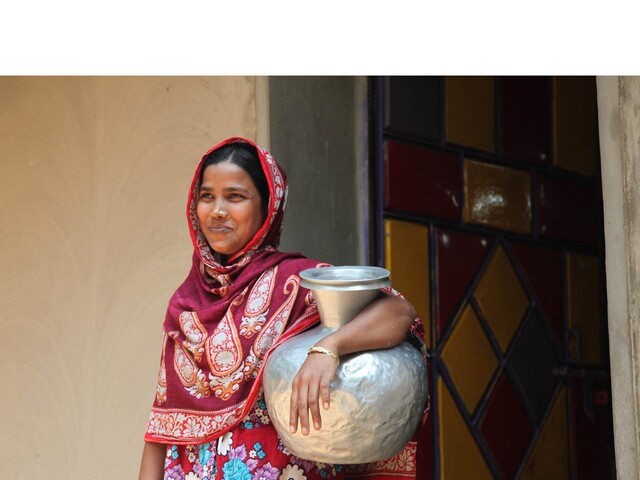
Opinions and voices for change
Navigate the blogs from our experts, water, sanitation and hygiene sector colleagues and guests. Narrow down your search by using the filters.
Faute d'un statut social élevé, les hygiénistes locaux formés pour faire la promotion de l'assainissement familial en milieu rural ont un impact limité. Le recours aux coutumiers et au religieux qui jouissent d'une plus grande écoute ne serait pas superflu. Read more...
The correlation between access to drinking water, health, nutrition and other development indicators is well known. At sector level, this often translates into the requirement to allocate additional funding to new infrastructure (in the rural sector, mainly to water points), that would naturally... Read more...
La corrélation directe entre l’accès à l’eau potable et le niveau de santé, de nutrition et autres indicateurs de développement est aujourd’hui largement reconnue. Sur cette base, le secteur conclut souvent qu’il est nécessaire d’allouer davantage d’investissements aux infrastructures (en milieu... Read more...
Selon l'UNICEF, la majorité des écoles du Burkina Faso ne disposent pas de d'installations sanitaires ou d'eau potable. Ce constat est décrit comme l'un des obstacles majeurs à l'éducation des enfants. Read more...
According to UNICEF, the majority of schools in Burkina Faso don't have drinking water or sanitation facilities. This has been identified as one of the major obstacles to children's education in the country. Read more...
Dans la foulée des changements sociopolitiques d'octobre 2014 au Burkina Faso, les conseils municipaux de l'ensemble des communes du pays ont été dissous. En perdant leurs partenaires clés, les ONG et associations conduisant des projets d'eau potable et d'assainissement doivent désormais trouver de... Read more...
Les programmes d'assainissement se concentrent en général sur la construction d'ouvrages, au détriment d'une promotion soutenue pour leur usage. Or, cette dernière peut faire plus pour la santé que n'importe quelle construction. N'importe quelle? Et si certains ouvrages favorisaient l'adoption de... Read more...
In the context of IRC's work on aid effectiveness and on official development assistance (ODA), a financial analysis of the national WASH programme implementation between 2007 and 2013 has been conducted in Burkina Faso. The following blog summarises the main findings and recommendations to better... Read more...
Dans le cadre du travail d'IRC sur l'efficacité de l'aide publique au développement (APD), une étude sur l'analyse du financement et de la mise en œuvre du programme national d'approvisionnement en eau potable et en assainissement (PN-APEA) couvrant la période 2007-2013 a été conduite au Burkina... Read more...
L'une des principales conditions pour la fourniture de services d'eau potable est que le fournisseur de service doit être en mesure de garantir que l'eau ne présente pas de risque pour la consommation. Mais qu'est-ce qu'on doit faire si on habite dans une région où ces services ne sont pas à portée... Read more...
One of the main conditions for providing potable water services is that the service provider must be able to guarantee that the water is safe for consumption. But what happens when you live in an area where such services are not within reach? Can you be sure that the water that is available is safe... Read more...
L'accès à l'eau joue un rôle important pour l'amélioration du bien-être des femmes du Burkina Faso. Mais les femmes aussi, jouent un rôle crucial dans la garantie de la pérennité des services d'eau dans le pays. Mais quel est le principal défi auquel sont confrontées les femmes au Burkina Faso en... Read more...
Not only does the accessibility of water play an important role in improving the well-being of Burkina Faso's women, but women too, play a crucial role in guaranteeing the sustainability of water services in the country. But what is the main challenge that women in Burkina Faso face when it comes... Read more...
IRC asked a private operator if it was possible to improve the service provided by hand-pump at current tariff. The answer is yes but the scale at which hand pumps are managed must change. Read more...
IRC Burkina Faso a demandé à un opérateur privé s'il était possible d'améliorer la qualité de service des PMH sans augmenter le tarif payé par les usagers. La réponse est : oui, mais il faut changer l'échelle de gestion de la maintenance. Read more...
This blog, written in the context of Burkina Faso, sets out how the lack of integrated approaches to WASH is one of the limiting factors in achieving universal access to WASH services. National policy makers and donor agencies insufficiently take the one-package WASH advantages into account, with... Read more...
IRC développe une méthodologie permettant de mesurer les changements de comportements dans le cadre d’un programme d’assainissement mettant en œuvre des latrines EcoSan. Read more...
It took high income countries 100 years to universalise the access to water and required long-term and massive public financing. Read more...
M&E are key to improving both the performance and the sustainability of WASH services. But how much do they cost and how should it be paid for? Read more...
Last week it was World Water Day 2014 , with the topic of "water and energy". I see obvious issues coming by on the water-energy nexus (which by the way is one of those development sector buzz words that I start disliking more every day. I hope the next buzz word is a bit more, uh, sparkling), such... Read more...